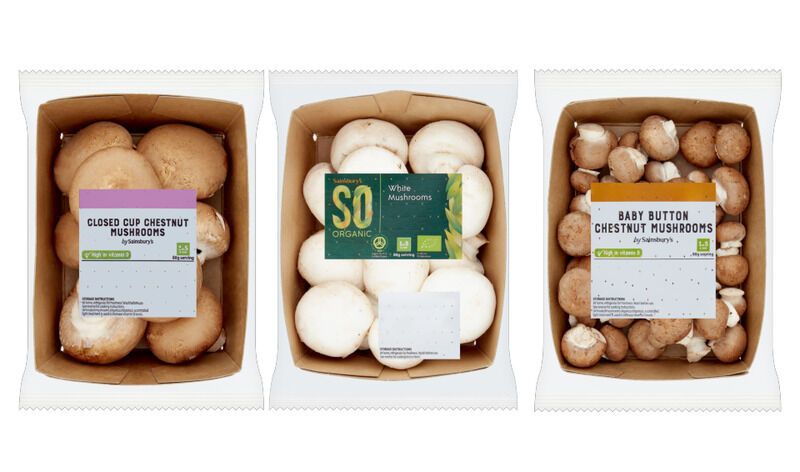
Sainsbury's Mushroom Punnets are Now Made with Cardboard
Michael Hemsworth — January 8, 2024 — Eco
References: about.sainsburys & retailtimes
Sainsbury's mushroom punnets are being shifted from plastic to cardboard for the company's own-brand fungi packaging in a bid to eliminate its use of ample amounts of plastic every year.
The packaging update comes as the brand's largest removal of plastic to date and will result in more than 775-tonnes of plastic from being used on a yearly basis. The cardboard packaging can be easily recycled from home, while the film packaging that covers the product can be recycled at one of the brand's flexible plastics recycling points to further round it out as quite eco-friendly.
Director of Product and Innovation Claire Hughs spoke on the new Sainsbury's mushroom punnets saying, "As part of our Plan for Better commitments, we are trying to reduce plastic packaging across our own brand ranges. We are delighted to introduce cardboard punnets for our own-brand mushrooms. Making a collective effort with suppliers to increasing recycled content and recyclability for all customers has helped achieve our biggest ever plastics removal so far. The initiative reflects our commitment towards a healthier and more sustainable future as we continue to look at ways to innovate our packaging and reduce and replace plastic where possible.”
The packaging update comes as the brand's largest removal of plastic to date and will result in more than 775-tonnes of plastic from being used on a yearly basis. The cardboard packaging can be easily recycled from home, while the film packaging that covers the product can be recycled at one of the brand's flexible plastics recycling points to further round it out as quite eco-friendly.
Director of Product and Innovation Claire Hughs spoke on the new Sainsbury's mushroom punnets saying, "As part of our Plan for Better commitments, we are trying to reduce plastic packaging across our own brand ranges. We are delighted to introduce cardboard punnets for our own-brand mushrooms. Making a collective effort with suppliers to increasing recycled content and recyclability for all customers has helped achieve our biggest ever plastics removal so far. The initiative reflects our commitment towards a healthier and more sustainable future as we continue to look at ways to innovate our packaging and reduce and replace plastic where possible.”
Trend Themes
1. Shift From Plastic to Cardboard Packaging - The trend of shifting from plastic to cardboard packaging presents disruptive innovation opportunities for companies to reduce plastic waste and improve overall sustainability.
2. Increased Focus on Recyclability - The trend of increased focus on recyclability allows companies to explore disruptive innovation opportunities in developing packaging solutions that are easily recyclable and contribute to a circular economy.
3. Collaboration with Suppliers for Plastics Removal - The trend of collaboration with suppliers to achieve plastics removal presents disruptive innovation opportunities for companies to work together and find innovative solutions in reducing plastic usage.
Industry Implications
1. Packaging Industry - The packaging industry can leverage the trend of shifting from plastic to cardboard packaging to disrupt traditional practices and offer more sustainable options for their customers.
2. Recycling Industry - The recycling industry can benefit from the increased focus on recyclability trend by investing in advanced recycling technologies and systems that can efficiently process and recycle different types of packaging materials.
3. Retail Industry - The retail industry can explore disruptive innovation opportunities through collaboration with suppliers and adopting more sustainable packaging practices to meet the growing consumer demand for eco-friendly products.
4.8
Score
Popularity
Activity
Freshness























